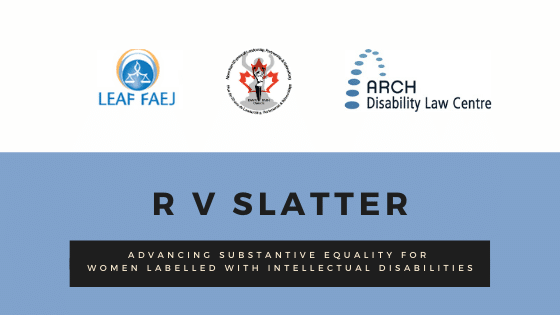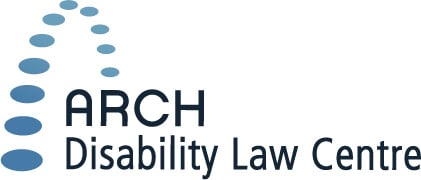
On Monday, March 30, 2020, LEAF, DisAbled Women’s Network Canada (“DAWN”), and ARCH Disability Law Centre (“ARCH”) filed a joint application seeking leave to intervene in R v Slatter at the Supreme Court of Canada (the “Court”). If granted leave, the LEAF-DAWN-ARCH coalition will advance an intersectional equality analysis highlighting the implications of the case on the substantive equality rights of women labelled with intellectual and/or developmental disabilities, and on their access to justice.
Facts
This case involves a woman labelled with an intellectual disability who disclosed sexual assault. At trial, defence counsel argued that the complainant’s evidence was unreliable, because her disability made her suggestible. The trial judge convicted the accused of sexually assaulting the complainant.
The majority of the Ontario Court of Appeal overturned the conviction and ordered a new trial, finding the judge’s reasons were not sufficient. In particular, the majority held that that the trial judge failed to address what they found to be a central issue: the complainant’s reliability and suggestibility. Justice Pepall, writing in dissent, disagreed. She found the trial judge’s reasons adequately addressed the challenge to the complainant’s reliability. She concluded that reliability had not been a critical issue at trial, because the evidence demonstrated that: a) no one had suggested the sexual assault allegations to the complainant; and b) the complainant’s disability did not make her less reliable.
LEAF-DAWN-ARCH’s interest in the appeal
If granted leave, LEAF-DAWN-ARCH will highlight the troubling implications of the Court of Appeal’s decision for the equality rights of women labelled with intellectual and/or developmental disabilities, including the barriers the decision establishes for access to justice.
The majority judgment suggests that trial judges must apply a more onerous standard when assessing the reliability of evidence of complainants labelled with an intellectual and/or developmental disability. The majority’s reasoning is rooted in harmful generalizations and stereotypes about women with disabilities. These stereotypes include assumptions that women labelled with intellectual disabilities are more suggestible, prone to people pleasing, and child-like, and that their testimony is to be treated with suspicion.
Stereotypes about women labelled with intellectual disabilities can serve to further silence their voices by minimizing the reliability of their testimony in sexual assault cases. Such silencing is evident in the case under appeal. This has a deeply damaging impact on access to justice for women labelled with intellectual and/or developmental disabilities. It is particularly troubling, given the high rates of sexual assault among women with disabilities.
Case committee and counsel
LEAF-DAWN-ARCH’s intervention in this case was informed and supported by a case committee composed of academics and practitioners with expertise in the relevant issues.
The committee members for this intervention are (in alphabetical order): Shelley Fletcher (People First of Canada), Karine-Myrgianie Jean-François (DAWN), Barb McIntyre (Boost Child & Youth Advocacy Centre), Janet Mosher (Osgoode Hall Law School), Roxanne Mykitiuk (Osgoode Hall Law School), and Tess Sheldon (Faculty of Law, University of Windsor).
LEAF-DAWN-ARCH would like to thank Suzan Fraser (Fraser Advocacy) acting on a pro bono basis and Kerri Joffe (ARCH) for their work as counsel on this leave application. Should the Court grant the LEAF-DAWN-ARCH coalition leave to intervene, they will also represent the coalition in this important intervention.

About Women’s Legal Education and Action Fund (LEAF)
The Women’s Legal Education and Action Fund (LEAF) works to advance the substantive equality rights of women and girls through litigation, law reform, and public education. Since 1985, LEAF has intervened in landmark cases that have advanced equality in Canada—helping to prevent violence, eliminate discrimination in the workplace, provide better maternity benefits, ensure a right to pay equity, and allow access to reproductive freedoms.

About DisAbled Women Network Canada (DAWN)
Established in 1985, DAWN is a national, feminist, cross-disability organization that has provided opportunities for self-determination and leadership development for women and girls with disabilities for 35 years. DAWN’s mission is to end the poverty, isolation, discrimination and violence experienced by Canadian women with disabilities and Deaf women. DAWN works towards the advancement and inclusion of women and girls with disabilities and Deaf women and girls by creating change at a systemic level. DAWN has intervened before the Supreme Court of Canada on its own, or in coalition with LEAF, in numerous criminal and human rights-related cases.

About ARCH Disability Law Centre (ARCH)
ARCH is a specialty legal clinic, with a 40-year history of defending and advancing the equality rights and inclusion of persons with disabilities. ARCH is governed by a community-based board of directors, the majority of whom are persons with disabilities. ARCH provides legal advice directly to persons with disabilities in Ontario, conducts test case litigation before all levels of courts and tribunals, and maintains an extensive law reform practice. ARCH has particular expertise in human rights law, equality rights law and access to justice for persons with disabilities.
